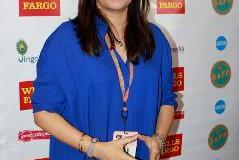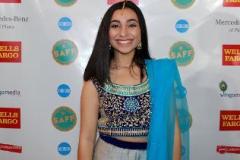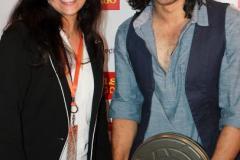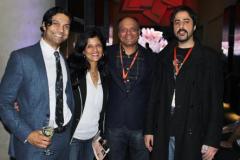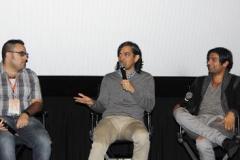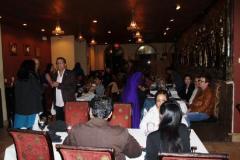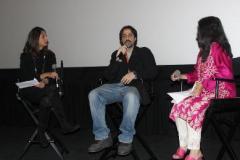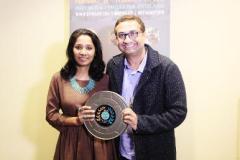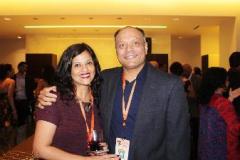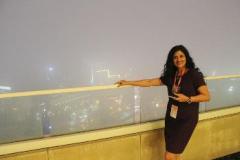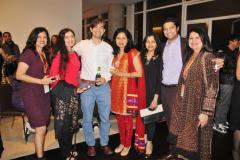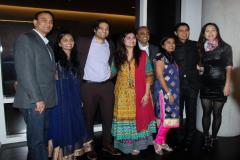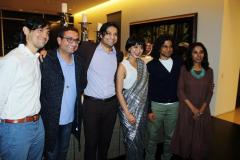DFWSAFF (the Dallas/Fort Worth South Asian Film Festival) hosted its 3rd annual event last weekend in Dallas from March 3rd to 5th, 2017. “Here’s to the fools who dare to dream”, Jitin Hingorani, the founder of DFWSAFF, quoted from one of his favorite movies La La Land as he kicked off the Opening Night screenings, “Yellow Tin Can Telephone” (short film) followed by the main feature, “A Billion Colour Story”.
Yellow Tin Can Telephone is a coming together of a stunningly colorful world of a girl who lives in silence and the black and white world of a boy whose life demands that it be devoid of colors. Asimah Mirza and Shikhar Misra project their existence beautifully in the short time that their story plays. Writer/ director, Arunima Sharma, obviously reels you in for her future endeavors.
Paired perfectly with the film preceding it, debutante director N. Padmakumar, successfully gives you a whole new depth to the perception of colors in his A Billion Colour Story. His real-life son who plays a central role in the film amazes you with his subtle and charming mannerism. The film takes you on an unforgettable ride of offering you a billion colors but yet keeping it beyond your reach. Sounds puzzling? Hopefully we have intrigued you enough to seek this one out and watch it. Post the screenings, was the Q&A with Padmakumar Narasimhamurthy. Of course I had to ask him why would he make a movie called “A Billion Colour Story” and then choose to narrate it in black and white? I am glad I asked for his answer was as interesting as his movie was. He pointed out the perception that we have of colors- how we relate girly colors on boys to being gay, how green is associated with Islam, and so on. His idea was to clear that slate, so to say, like seeing the world from a child’s perception, free of any biases. Next up- the red carpet and the VIP Reception After-Party gave media and DFWSAFF’s lifetime members the opportunity to mingle with stars of the weekend- actors/ writers/ producers/ directors from several of the movies that were part of the festival.
The following day, DFW movie buffs were treated to more thought provoking and motivational movies, each picked with great care, for their core message, content and creativity, falling in different categories including LGBT Programming, Indo-Pak Programming, Men’s Programming, Children’s programming and Women’s programming. The chosen films were clearly stellar picks in their categories, delivering powerful message of empathy and understanding. “Any Other Day” (short) and “Breaking Free” (documentary) hampered home the unfairness of the situation that LGBTQ community faces day in and day out- of having to fight for the very basic of rights- rights that we have won ages back, that we now take for granted. “Silvat” (short, from India), “Lala Begum” (short, from Pakistan) and “Guddu Engineer” (short, from India) were picked among 12 films- six by film makers from Pakistan and six from those in India, as a result of a call by Zeal for Unity Films to promote Indo- Pak programming for unity. Mochi” (short), “Babu’s Dilemma” (short), “Azaad” (short), and the evening’s feature, “Khoya” (feature) that were threaded together to constitute Men’s Programming, brought forth the dilemma of a father, a son, that of a husband who has to travel far for work, or simply of a man looking for his family. The main feature Khoya, although slow- paced keeps you tied to the Canadian Indian protagonist, played by Rupak Ginn, in his quest to find his birth family in India. In the Q&A that followed, I had to tell Rupak that if one has to stare at one face for over an hour- in close ups and at different other angles, his face was a good one to keep one’s eyes on. As for Sami Khan, he talked of how the film came about, the story being close to his heart due to his personal search for his own brother. Later during the after- party I had a chance to talk to him some more. I had an opportunity to tell him that even though you see similar story-lines, his film depicts the mental state associated with such a quest in a very matter of fact manner- the protagonist is not overly sad, he is quietly determined, he is not burdened with hardships, merely taking it in his stride, not beaten by the system, just going about his options. I also told him how much I loved watching the care-free young man with the fake Gucci jacket in the film- depicting a sizable Indian population, and the recluse host- also the kind you’ll find in good numbers in the land of billion people.
Other movies that had the honor of being showcased at the festival were “Priyanth” (short), “Jacob’s Pond” (short)
“Mast Qalandar” (short), and “Syaahi” (short)- presented back to back, under the banner of Children’s Programming on Sunday. There was the much awaited documentary, “The Journey Within” followed by Q&A with director Mian Adnan Ahmad from Pakistan. The documentary follows the journey to success of the Coke Studio Show. Although we missed a large chunk of the documentary itself, the cultural heritage and the traditional depth in music blended with the contemporary seen in parts we did watch was enough to send us frantically running to Adnan to ask him where can we catch it next? There were those wanting to know where can they watch it again? Later we caught up with him during the closing night after-party and asked him what he thought of the protests in India against Pakistani artists being cast in Hindi films and the controversy that is never far behind in Pakistan with the on-again-off-again ban on Hindi films. “Art knows no boundary, it is bigger than borders, it should be shared, appreciated and enjoyed beyond the limits of a nation or a religion”, he said. Women’s Programming constituting
“Amishi” (short), “Leeches” (short), and the Closing night feature, “Doctor Rakhmabai” formed the grand finale of the film festival, again covering many women-centric thought provoking topics. While Amishi is a subtle 7 minutes long depiction of surrogacy, there is Leeches that depicts the strength of a woman willing to go to any length to save her sister even as poverty pushes her family to sacrifice their own. And finally, Doctor Rakhmabai, the tale of India’s first woman (practicing) doctor during the British era was definitely the show stopper, premiering internationally at the festival. The period film so stunningly portrayed that you are left dumb-founded at the sets- the large Victorian style buildings, the British-era clothing and the cars- all portrayed with immense attention to details. Tannishtha Chatterjee as the doctor herself wins you over with her performance and you don’t quite get over the details depicted in the film for a long time afterwards. Q&A with actresses Tannishtha Chatterjee and Sayani Gupta followed the feature and then it was time for the closing night after party at the W Hotel Penthouse in Dallas downtown. Needless to say, it was an amazing evening on the 28th floor with the media, lifetime members of SAFF and the guests hovering over the stars, asking questions, taking pictures with them- all over chic hors d’oeuvre from the Spice In The City.
All pictures by Sanjay Kulshrestha




